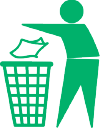We’re perplexed and happy to see the rollout of the latest Repak PR campaign TeamGreen . It’s a laudable aim – to get more people aware of and actually doing recycling. But is it just a cynical ploy to ‘look busy’ with taxpayers money and be loose with Repak members’ fees? Are we being eco-scammed by a greenwashing campaign or is it a legitimate effort to help us cut waste volumes, cut our waste costs and live more sustainably?
So let’s see who are the winners and losers of this ‘call to action’.
There are good bits about Repak #TeamGreen.
- For a start, it’s great that they managed to get some Irish celebrities and sports people to raise awareness & encourage better recycling habits.
- There are prizes (gift vouchers) to be randomly given out to new ‘members’ until December 2019.
Timing and Targeting
The timing is interesting to start with. There’s a Deposit Refund Scheme (DRS) desktop analysis in progress (for the past month), to assess viability on behalf of Minister Bruton. This will be completed in a few months. Data is being collected, surveys taken and future options being proposed by the UK’s Eunomia Consultants. As per their previous examinations of such systems in other countries (e.g. Spain, Scotland, Czech Rep) we guess that they will likely recommend a similar system here as the one to be launched in Scotland shortly. There will then be an Open Tender for a National Central operator for such a DRS scheme. So getting some visibility now and ‘looking busy’ in the recycling space might help Repak to procure this lucrative monopoly national Tender when the call comes.
The other perplexing thing about the #TeamGreen is that it is targeted at those at the tail end of the waste pipeline – the consumer. Consumers are the big losers in recycling. They can do the least to stop the placement of plastic goods and packaging of all sorts on the market.

So more recycling items collected means the consumer pays more in their bin charges. (recycling charges average 8c/kg in May 2019 but expect these to increase with our Governments new found Green vision to tackle Climate change.). That’s not a winning position for all us consumers out here in plastic polluted land!
If Repak Recycling really wanted to cut the amount of plastic being placed on the market they would tackle the original sources of the plastic – the packaging producers and suppliers.
Sustainable Solution?
We must simply TURN OFF THE SUPPLY TAP, Not supply more buckets.
So the most effective change to make to the #TeamGreen message is to BUY LESS PLASTIC ITEMS EVERY DAY. Just one less item every day, like the campaign message says. (But no need to recycle extra just avoidance). That includes wrapping. This will result in less plastic on the market, less plastic entering the waste stream and less needing to be recycled. Who wins in this scenario? Repak will have less volumes of plastic to collect. That means less revenue for them. (Oops ! That might hurt their business model.) The consumer will have less volume and weight of plastic in his/her bin. That lowers the collection cost. Great !
PacketIn example
A good example is the situation regarding Crisp Packets, which are currently not recyclable in Ireland. Specialist recycling facilties deal with collected crisp wrappers in the UK and Zero Waste Alliance Ireland has partnered with TerraCycle to collect wrappers in Ireland and ship them to the UK for correct treatment. New Plastic items are made from the re-cycled and re-manufactured raw materials in the bags.
So, Why have organizations like Repak not taken this initiative already? They are well funded to do so, unlike the Irish NGOs who promote such campaigns as #PacketIn and #ConsciousCup where results are delivered with far less PR spin.
If our Government and the state sponsored organizations really wanted to improve recycling they would stop blocking the proposed plastic #depositandreturn system in #WasteReductionBill…
Where does the collected plastic go?
We need the EPA, Waste Collectors, MRF operators and Repak to come clean with us on where the plastic recycling waste stream currently goes. Only 36% actually gets recycled into new products (see EPA progress report), most go to WTE (Incineration) or Landfill due to ‘contamination’. So REPAK needs to tell us just how much of our recyclables really get recycled. How much gets exported? How much gets recycled properly in Ireland.
One can’t help but sniff a whiff around our official recycling statistics while there remains a lack of transparency into the details of eventual outcomes.
